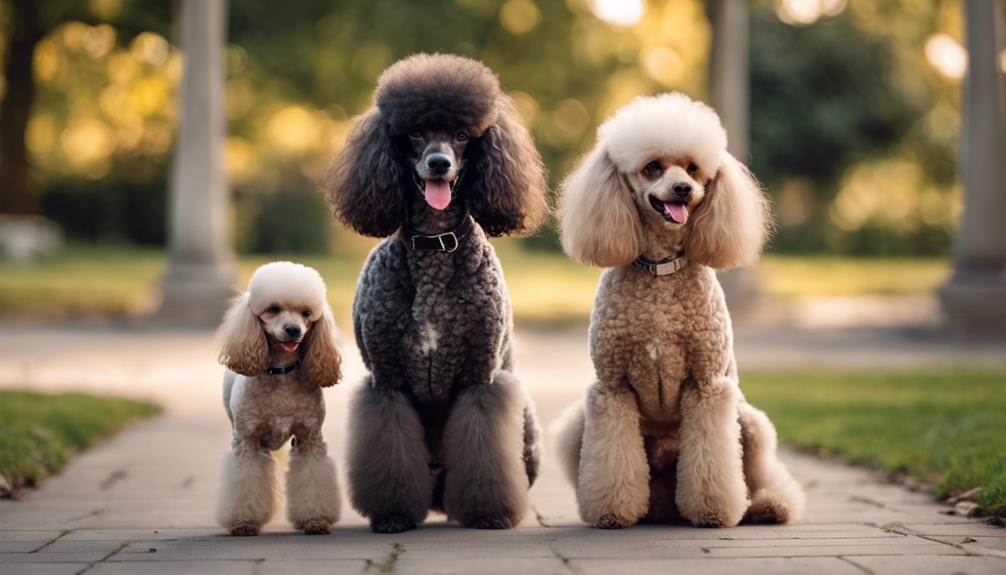Imagine selecting a book from a shelf, each size representing a different Poodle variation—Toy, Miniature, and Standard. Just as each book holds unique stories waiting to be explored, so do the distinct sizes of Poodles offer varying characteristics and traits. Understanding these differences is like deciphering a captivating narrative that unfolds with every turn of the page. Grab a metaphorical bookmark and prepare to unravel the diverse world of Toy, Miniature, and Standard Poodles, discovering which tale resonates most with your lifestyle and preferences.
Key Takeaways
- Toy Poodles are small, gentle, and intelligent companions, ideal for those seeking a petite and clever breed.
- Miniature Poodles are versatile, family-friendly dogs with a curly coat, fitting for various living situations.
- Standard Poodles are energetic, friendly, and excel in activities like dog sports and obedience training.
- Regardless of size, Poodles are highly trainable, sociable, and adaptable dogs that form strong bonds with their owners.
Size Variations Among Poodles
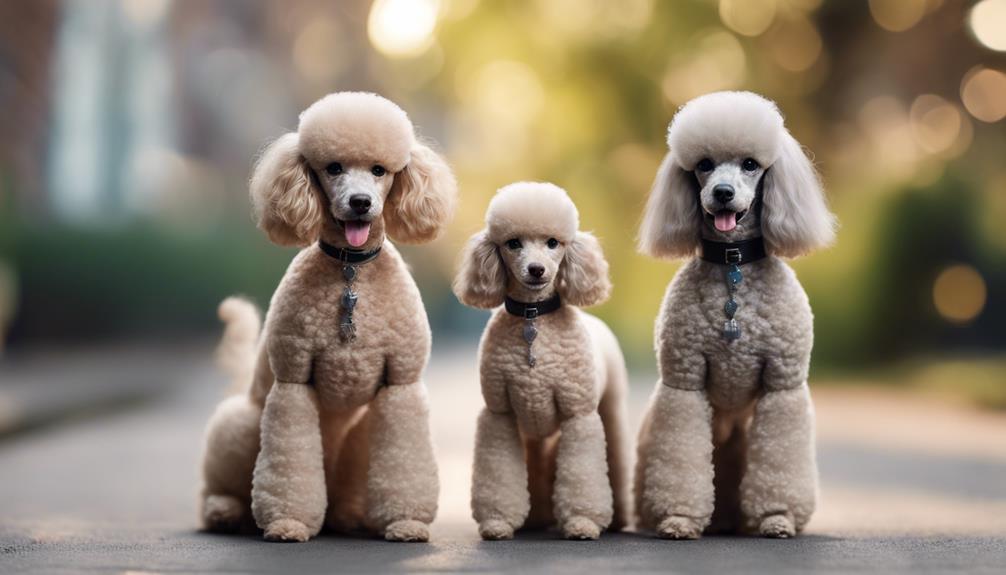
When categorizing Poodles based on size, they are typically classified into three main varieties: Toy, Miniature, and Standard. Standard Poodles can reach heights of 24 inches, while Miniature Poodles max out at 15 inches, and Toy Poodles average 8-10 inches. In terms of weight, Miniature Poodles weigh between 10-15 pounds, Toy Poodles weigh under 6 pounds, and Standard Poodles weigh between 40-70 pounds. Despite the size differences, all Poodles share the same build and similar physical characteristics.
Toy Poodles, being the smallest of the three varieties, tend to live longer than their larger counterparts. This longevity can be attributed to their smaller size and reduced strain on their bodies. Additionally, Toy Poodles are known for their intelligence and agility, making them delightful companions. Understanding the size variations among Toy, Miniature, and Standard Poodles can help in selecting the right fit for your lifestyle and preferences.
Physical Characteristics of Toy Poodles
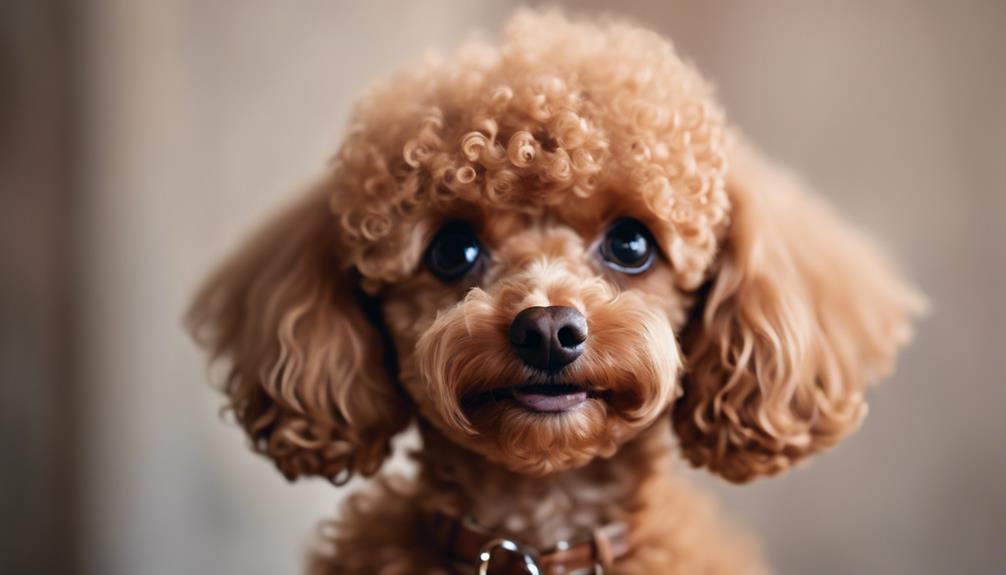
Toy Poodles exhibit distinctive physical characteristics that set them apart from other Poodle varieties, showcasing their small stature and unique coat textures. These petite dogs typically stand no more than 10 inches tall and weigh under 6 pounds, emphasizing their compact build. One of the most notable features of Toy Poodles is their curly, woolly coat that comes in various colors, adding to their charm and elegance.
Despite their diminutive size, Toy Poodles are known for their intelligence, trainability, and gentle nature, making them excellent companions for individuals or families. It is essential to be aware of common health issues that affect Toy Poodles, such as patellar luxation, dental problems, and eye diseases, to ensure their well-being.
Even though they are the smallest Poodle variety, Toy Poodles share similar temperament traits with their larger counterparts, the Miniature and Standard Poodles, making them versatile and beloved pets in various household settings.
Appearance Distinctions in Miniature Poodles
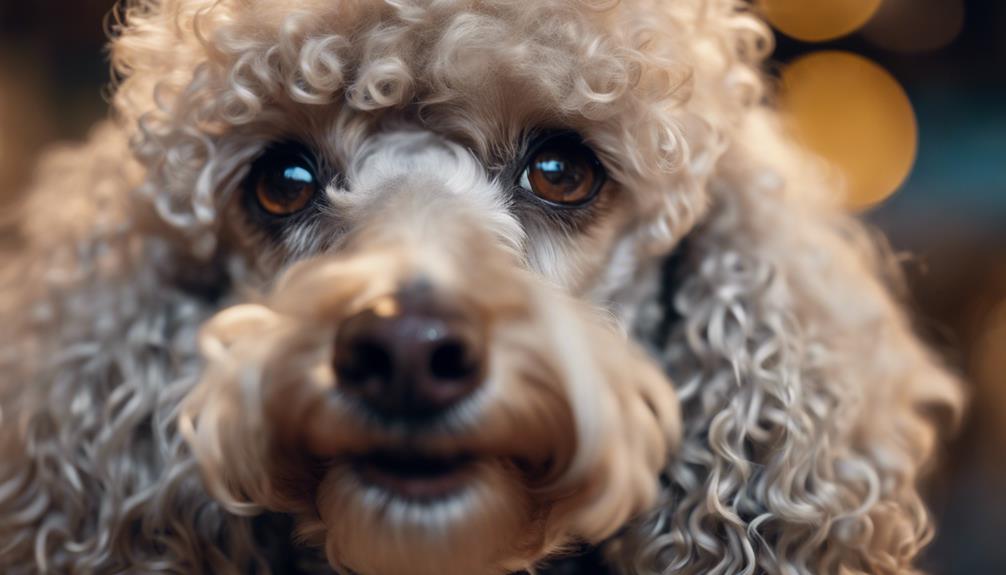
Miniature Poodles present distinct physical characteristics that distinguish them within the spectrum of Poodle varieties, showcasing a moderate size that falls between Toy and Standard Poodles. Typically ranging between 10-15 inches in height at the shoulder and weighing around 10-15 pounds, Miniature Poodles are larger than Toy Poodles but smaller than Standard Poodles. Their curly and dense coat is a shared trait with other Poodle types, but their size sets them apart. Due to their moderate size, Miniature Poodles are often considered suitable for families and apartment living.
However, it's essential to note that Miniature Poodles are known to have a higher incidence of health issues compared to Toy and Standard Poodles. This increased risk necessitates regular grooming and veterinary care to maintain their well-being. Understanding these size differences, appearance traits, and potential health concerns can help you provide the best care for your Miniature Poodle companion.
Temperament Traits of Standard Poodles
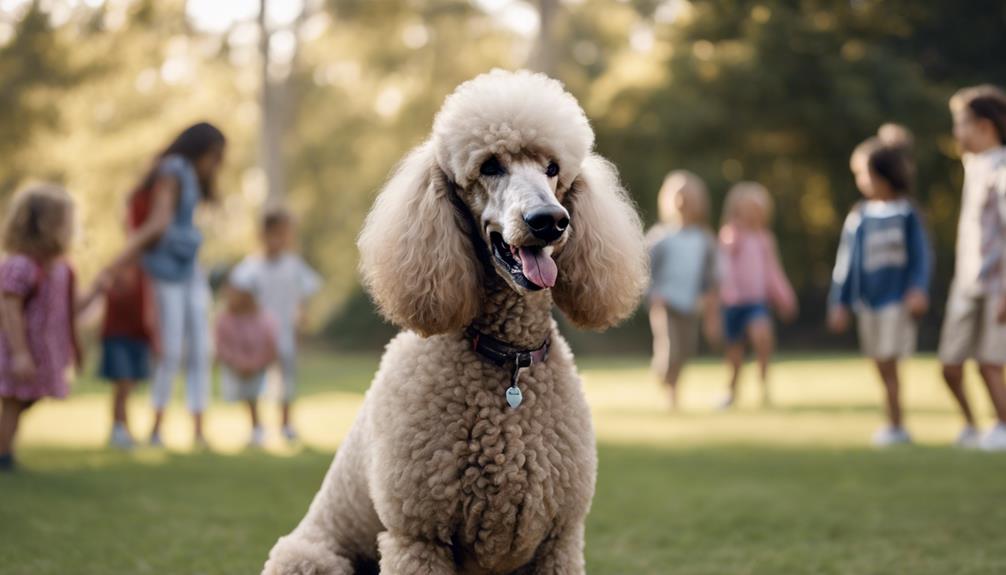
Standard Poodles exhibit a distinct temperament characterized by their energetic and alert nature, making them exceptional watchdogs and companions. They are known for being friendly and outgoing, enjoying social interactions and various activities. Standard Poodles are highly trainable, excelling in dog sports and obedience training. Their larger size compared to Toy and Miniature Poodles does not diminish their agility and intelligence. Originally bred as water retrievers for hunting, Standard Poodles possess a strong work ethic and adapt well to different environments. This breed’s versatility extends to their striking appearance, which can include a variety of coat colors and patterns. Among these, phantom poodles coat patterns stand out, featuring distinct markings similar to those seen in Dobermans or Rottweilers. Combined with their intelligent demeanor and athletic capabilities, Standard Poodles truly exemplify both beauty and functionality in the canine world. This rich history of poodle breeds highlights their evolution from skilled hunting dogs to versatile family companions. Their curly, hypoallergenic coats not only make them stand out aesthetically but also serve a practical purpose, protecting them from harsh weather conditions during water retrieval tasks. Today, Standard Poodles continue to captivate dog enthusiasts with their blend of elegance, intelligence, and loyalty. This combination of qualities makes Standard Poodles a favorite choice for families, active individuals, and even professional trainers. To ensure their health and overall well-being, consistent grooming and dental care are crucial, including the use of the best dog toothbrushes for poodles to maintain their oral hygiene. By addressing both their physical and mental needs, owners can foster a happy, healthy, and well-rounded companion in their Standard Poodle.
| Temperament Traits of Standard Poodles | |||
|---|---|---|---|
| Energetic | Trainable | Friendly | Alert |
Health Considerations for Toy Poodles
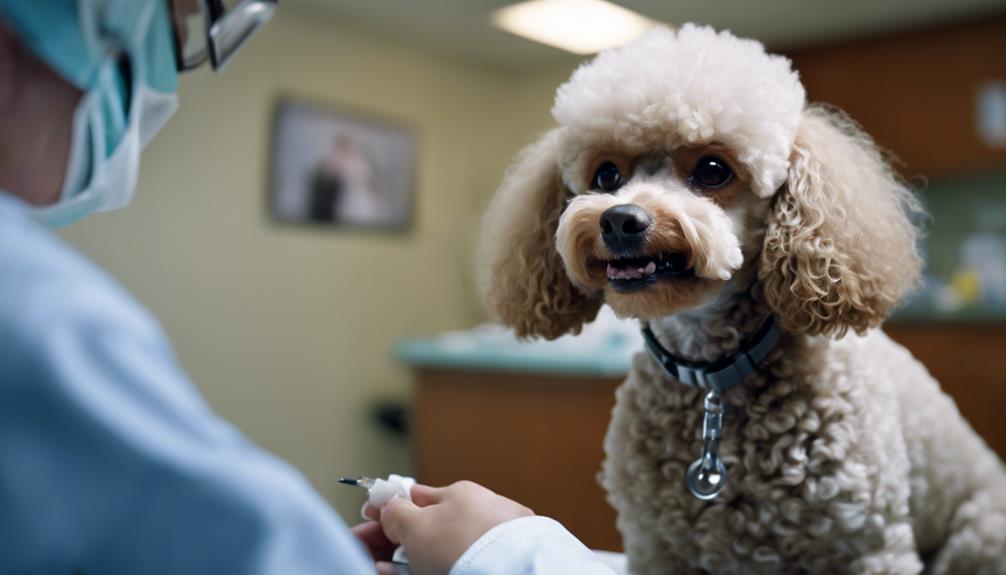
Toy Poodles, due to their small size, are susceptible to health issues such as patellar luxation, dental problems, and eye diseases like cataracts and progressive retinal atrophy. Regular dental care, veterinary check-ups, and monitoring are crucial to ensure the well-being and longevity of Toy Poodles. Their fragility compared to larger Poodle varieties necessitates attentive care to prevent injuries and maintain their health. Additionally, their floppy ears make them prone to ear infections, which require diligent cleaning to avoid discomfort or complications. Using the best poodle ear cleaners can help maintain proper ear hygiene and reduce the risk of infections. By combining careful health management with a loving environment, Toy Poodles can thrive and lead happy, healthy lives. Additionally, their delicate digestive systems can make them prone to food sensitivities, emphasizing the importance of a carefully chosen diet. For concerned owners, poodle food allergies explained can shed light on common triggers such as wheat, soy, or certain meats that might cause adverse reactions. By being proactive in addressing these dietary needs, owners can help their Toy Poodles thrive and avoid unnecessary discomfort or illness. Providing a balanced and species-appropriate diet tailored to their size and activity level is essential in managing their overall health. Following poodle diet and nutrition tips such as selecting high-quality dog food, avoiding excessive treats, and incorporating veterinarian-recommended supplements can help support their delicate systems. With proper care and attention, these intelligent and affectionate companions can lead happy and healthy lives.
Toy Poodle Lifespan
Ensuring the longevity and well-being of your Toy Poodle requires diligent attention to potential health concerns such as patellar luxation, dental issues, and eye diseases. Toy Poodles typically have a lifespan of around 12-15 years. Dental problems are common in Toy Poodles due to their small size, which can lead to issues like periodontal disease if not properly managed. Regular dental check-ups and cleanings are essential to prevent dental issues that could impact your Toy Poodle's overall health and lifespan. Monitoring their diet, providing appropriate chew toys, and brushing their teeth regularly can help maintain good oral health. By addressing dental problems promptly and ensuring proper care, you can help prolong your Toy Poodle's lifespan and keep them healthy and happy for years to come.
Common Health Issues
When considering the health of Toy Poodles, it is essential to be aware of common issues such as patellar luxation, dental problems, and eye diseases. These health considerations play a significant role in the well-being of your beloved Toy Poodle. Here are some key points to keep in mind: Regular veterinary check-ups are crucial to detect and address any emerging issues early, ensuring your pet stays happy and healthy. Proper dental care can help prevent gum disease and tooth loss, which are among the common health problems in Poodles. Additionally, maintaining a balanced diet and providing routine exercise can support your dog’s overall health and reduce the risk of obesity-related complications.
- Patellar Luxation: This condition involves the dislocation of the kneecap and is a common concern in Toy Poodles due to their small size.
- Dental Problems: Toy Poodles are prone to dental issues like tooth decay and gum disease, emphasizing the importance of regular dental care.
- Eye Diseases: Keep an eye out for conditions such as cataracts and progressive retinal atrophy, which can impact your Toy Poodle's vision.
- Weight Monitoring: Maintaining a healthy weight through proper diet and exercise is crucial for the overall health of Toy Poodles.
Personality Traits of Miniature Poodles
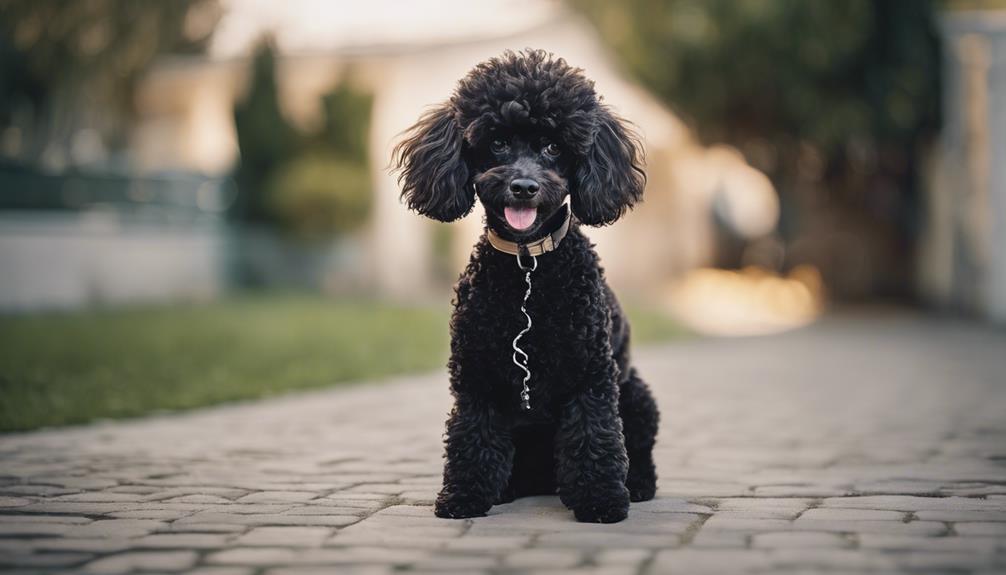
Miniature Poodles exhibit a distinctive blend of intelligence, adaptability, and sociability, which contribute to their excellent reputation as companion animals. Their friendly demeanor and ability to adjust to various living environments make them popular choices for households of all sizes. Understanding the nuances of Miniature Poodle behavior and personality traits can provide valuable insights into their suitability as family pets.
Miniature Poodle Temperament
With a reputation for high intelligence and sociability, the temperament of Miniature Poodles is characterized by friendliness and adaptability, making them ideal companions for various living situations. Here are some key personality traits of Miniature Poodles:
- Intelligent: Miniature Poodles are known for their cleverness and ability to learn quickly, making them easy to train for various tasks and commands.
- Affectionate: They form strong bonds with their human family members and enjoy being involved in family activities, showing affection and loyalty.
- Playful: Miniature Poodles have a playful nature that persists into adulthood, enjoying interactive games and activities that stimulate their minds.
- Adaptable: Due to their size and adaptable nature, Miniature Poodles can thrive in different environments, including apartments, provided they receive enough mental and physical stimulation.
Mini Poodle Behavior
In studying the behavior of Miniature Poodles, one can observe a remarkable combination of intelligence, sociability, and adaptability that defines their distinct personality traits. These dogs are highly intelligent, making them easily trainable and responsive to commands. Their friendly nature allows them to get along well with children, other pets, and strangers, making them excellent companions for families. Miniature Poodles thrive on human interaction and are known to form strong bonds with their owners. Their adaptable behavior makes them well-suited for various living situations, including apartments. Overall, the Miniature Poodle's intelligence, trainability, and friendliness contribute to their reputation as one of the most popular and beloved dog breeds among families and individuals alike.
Personality Traits Summary
Highly intelligent and sociable, the personality traits of Miniature Poodles exhibit a remarkable blend of adaptability and responsiveness that define this breed's distinct character. When considering Miniature Poodles, it is essential to understand their specific personality traits:
- Trainability: Miniature Poodles are highly trainable, excelling in obedience training and various dog sports due to their intelligence.
- Sociability: Known for their friendly nature, Miniature Poodles make excellent companions for both families and individuals, thanks to their sociable demeanor.
- Activity Level: Despite their smaller size, Miniature Poodles have a moderate activity level, enjoying walks and interactive playtime with their owners.
- Similarities with Standard Poodles: Miniature Poodles share many personality traits with Standard Poodles, such as alertness and quick wit, despite their size difference.
Grooming Needs for Standard Poodles
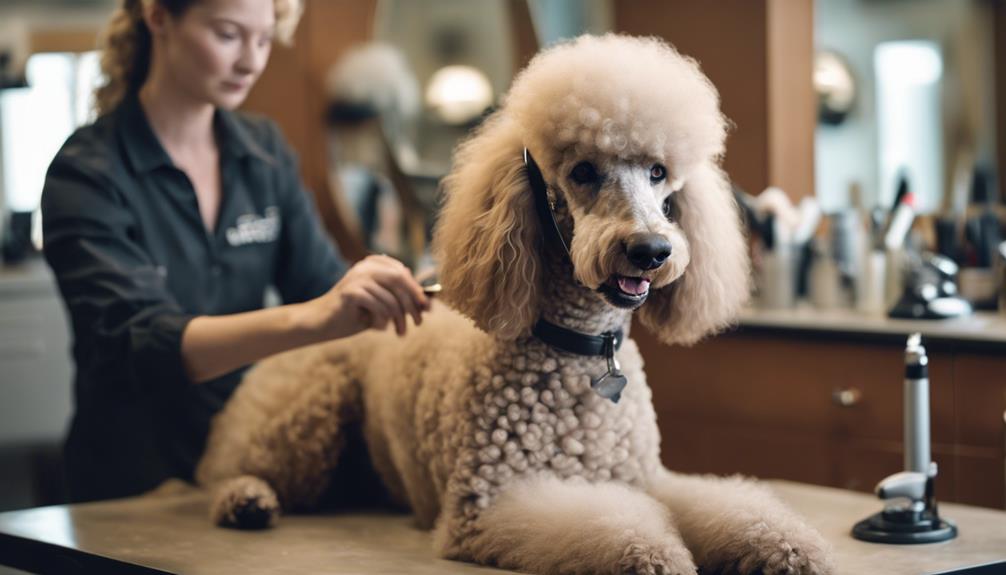
Regular grooming is essential for Standard Poodles to maintain their curly coat and prevent matting. This grooming routine involves brushing their coat at least every other day to prevent tangles and mats from forming. Professional grooming every 4-6 weeks is also recommended to keep their coat in optimal condition. During these sessions, it is common to trim around the face, feet, and tail to maintain a tidy appearance. Furthermore, regular grooming not only helps in the upkeep of their coat but also allows for thorough skin and coat health checks, enabling early detection of any potential issues. Standard Poodles have a unique coat that requires attention to detail during grooming to ensure their well-being and overall appearance. By staying consistent with grooming practices, you can help your Standard Poodle maintain a healthy and beautiful coat that reflects their breed's elegance. Additionally, poodles with rare coat patterns may require extra attention during grooming to ensure their unique markings are maintained and highlighted. Careful and consistent grooming not only showcases their distinct beauty but also supports their comfort and overall health. By dedicating time to proper care, you can help your Standard Poodle look and feel their best, regardless of their coat pattern.
Activity Levels of Toy Poodles
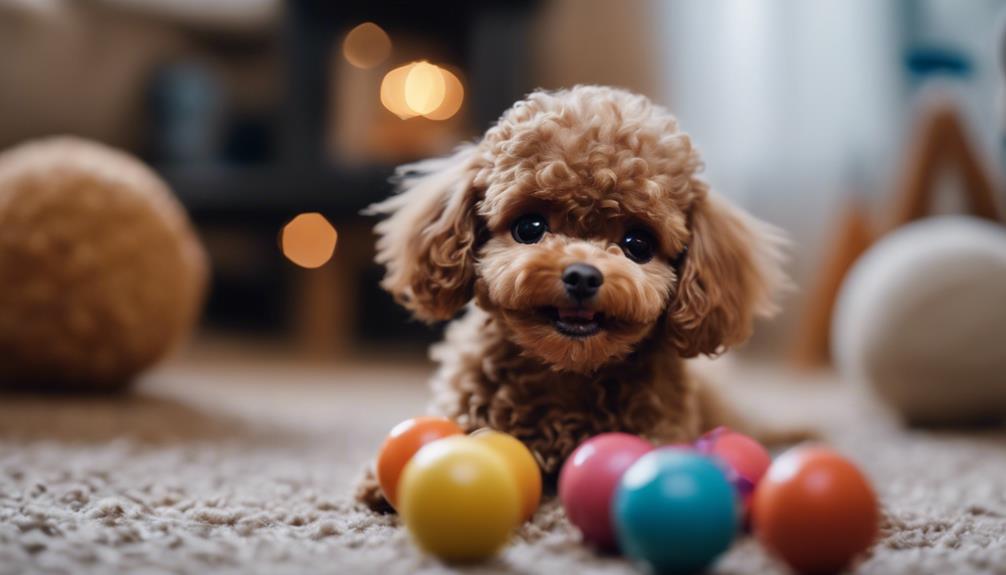
Maintaining the activity levels of Toy Poodles is crucial for their overall well-being and mental stimulation, especially considering their high energy despite their small size. When it comes to ensuring your Toy Poodle stays healthy and happy, here are four essential considerations: Providing regular exercise tailored to their energy levels is key, such as daily walks, playtime, or even agility training to keep them physically and mentally engaged. Additionally, monitoring their behavior for poodle stress signs to watch is important, as excessive barking, pacing, or changes in eating habits can indicate underlying issues. Balancing activity with adequate rest periods will ensure your Toy Poodle remains both energetic and calm.
- Daily Exercise: Toy Poodles need regular physical activity to stay fit and burn off excess energy. Engaging in activities like short walks, interactive play sessions, or agility games indoors can help meet their exercise needs.
- Mental Stimulation: Due to their intelligence, Toy Poodles thrive on mental challenges. Providing puzzle toys, training sessions, or learning new tricks can keep their minds sharp and prevent boredom.
- Tailored Activities: It's important to tailor activities to suit the size and energy levels of Toy Poodles. Ensuring that the exercise is appropriate for them will help prevent injuries and keep them safe.
- Behavioral Health: Regular playtime and exercise not only keep Toy Poodles physically healthy but also prevent behavioral issues that may arise from excess energy. Meeting their activity needs will result in a well-adjusted and content Toy Poodle companion.
Lifestyle Impact of Miniature Poodles
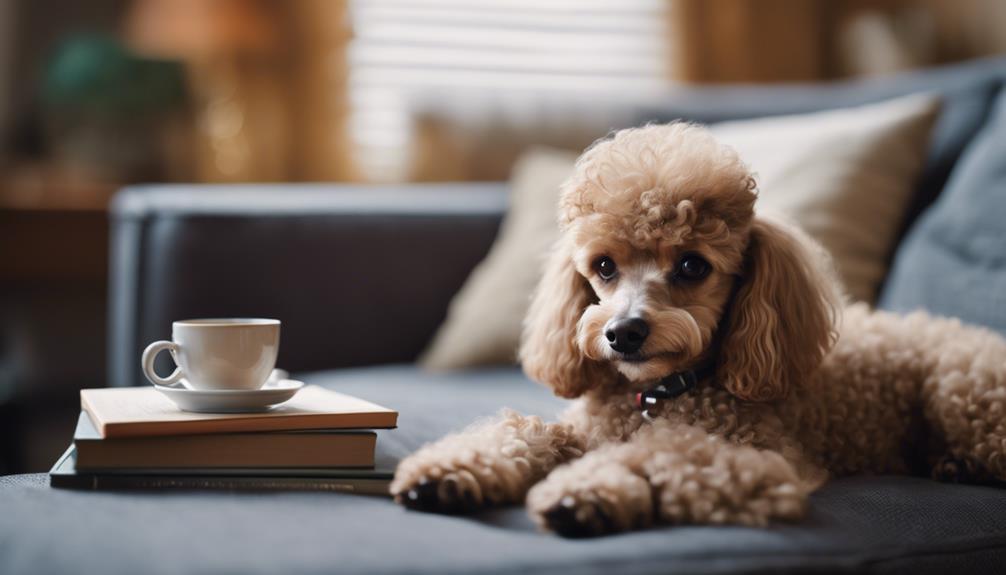
Miniature Poodles, being well-suited for apartment living due to their small size and adaptable nature, have distinct lifestyle impacts that require careful consideration. Their compact size makes them ideal for smaller living spaces, but it's important to note that they still need mental stimulation and exercise to thrive. Regular grooming is a crucial aspect of caring for Miniature Poodles, as their curly coats can mat easily if not properly maintained. Additionally, due to their smaller stature, they may be more prone to certain health issues compared to larger Poodle varieties. Despite sharing traits like intelligence and trainability with Standard Poodles, Miniature Poodles have unique needs that must be met to ensure their well-being. Understanding the lifestyle impact of Miniature Poodles is essential for anyone considering bringing these charming and energetic companions into their homes, especially if living in an apartment setting where their small size and adaptable nature truly shine.
Comparing Temperaments of All Three Sizes
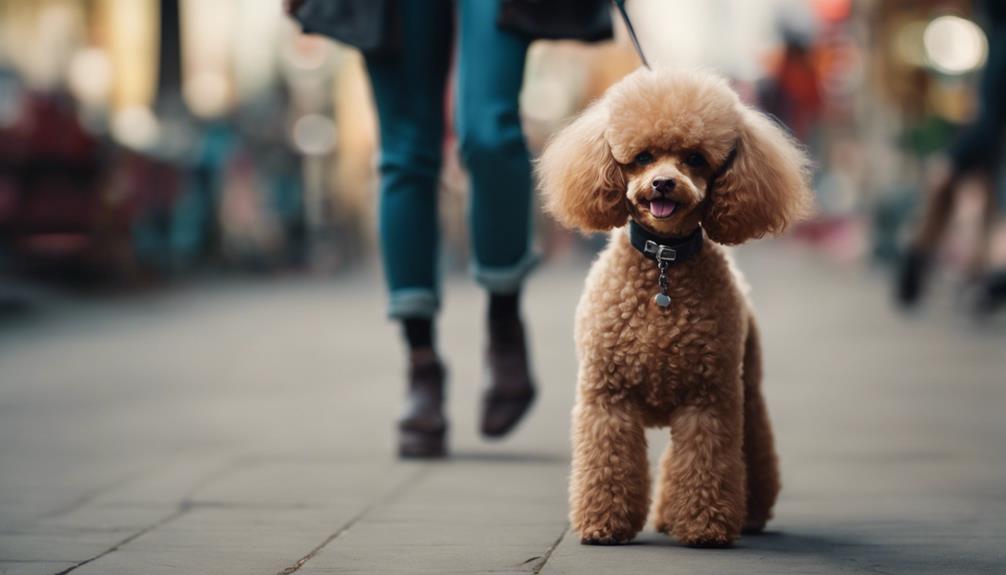
Considering the distinctive temperaments of Toy, Miniature, and Standard Poodles provides valuable insights into their behavioral characteristics and individual traits. When comparing the temperaments of these Poodle sizes, it's essential to note the following:
- Toy Poodles: Known for being energetic, alert, quiet, and gentle companions, Toy Poodles exhibit a lively demeanor that is balanced by their gentle nature.
- Miniature Poodles: Displaying lively behavior with slightly less activity compared to Standard Poodles, Miniature Poodles bring energy and playfulness into their interactions, making them delightful companions.
- Standard Poodles: Described as energetic and alert, Standard Poodles showcase their intelligence and agility, making them versatile and quick learners.
- Common Traits: All three sizes of Poodles share a common trait of being highly intelligent, trainable, and friendly. Proper socialization and mental stimulation are essential for nurturing the friendly and active nature of all Poodle sizes.
Frequently Asked Questions
What Is the Difference Between a Poodle Toy and Miniature and Standard?
The difference between a Poodle toy, miniature, and standard lies in size, coat variations, exercise requirements, grooming needs, and temperament differences. Understanding these distinctions is crucial for tailoring care to each Poodle's specific needs. While all Poodles share intelligence and a hypoallergenic coat, their sizes influence their overall lifestyle and care. For instance, Standard Poodles require ample space and exercise, whereas Toy and Miniature Poodles are better suited for apartment living. Additionally, when considering poodles and regional variations, factors like climate and local grooming practices can further shape their care and maintenance routines.
What Are the 4 Sizes of Poodles?
Poodles come in four sizes: Toy, Miniature, Medium/Standard, and Royal. Toy Poodles are the smallest, while Standard Poodles are the largest. Each size has unique grooming, exercise, temperament, and health needs, making them suitable for different living situations and owners.
Are Toy Poodles as Smart as Standard Poodles?
Yes, Toy Poodles are as smart as Standard Poodles. Their training capabilities, intelligence levels, and behavioral traits are on par. Adaptability to living spaces is also similar. Embrace their intellect and enjoy their company.
Which Size Poodle Is the Healthiest?
In terms of health, the size of Poodle that is generally considered the healthiest is the Toy Poodle. Due to their longer lifespan and fewer health risks compared to Miniature and Standard Poodles, they may be the best choice for overall well-being.
Conclusion
In conclusion, when considering a Poodle as a pet, it is crucial to understand the differences among Toy, Miniature, and Standard sizes. Each size variation comes with unique characteristics and care needs that can impact your lifestyle and preferences. Whether you prefer the cuddly nature of a Toy Poodle, the people-pleasing qualities of a Miniature Poodle, or the athleticism of a Standard Poodle, there is a perfect match for every dog lover. Choose wisely and enjoy the companionship of your intelligent and friendly Poodle.
